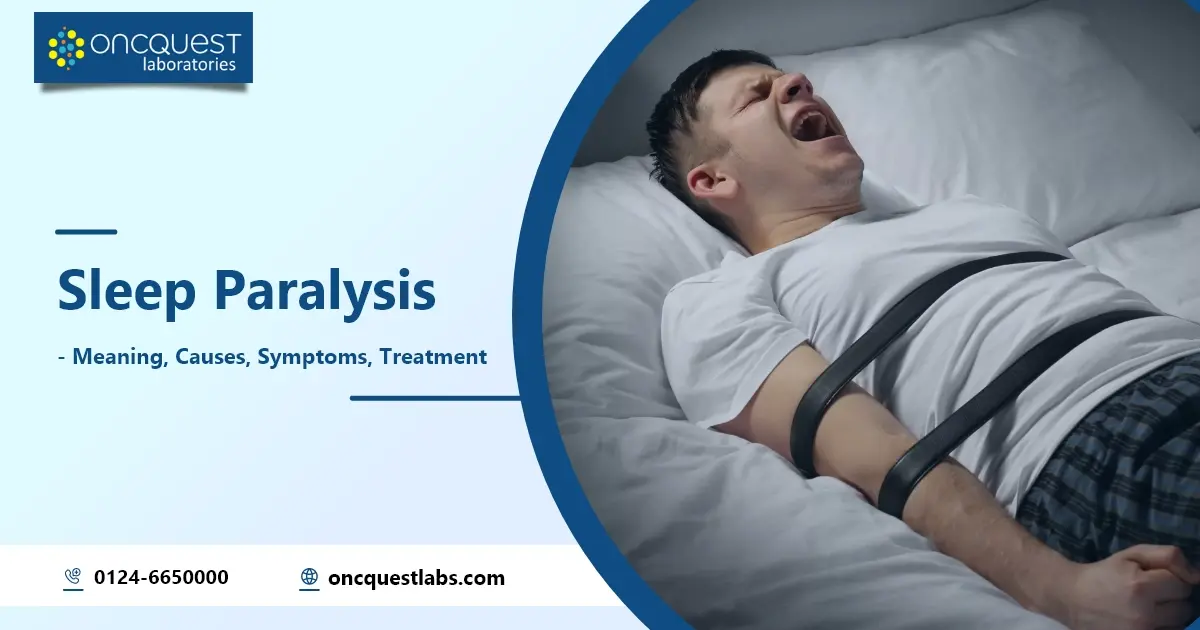Sleep is an essential aspect of our daily lives, a sanctuary where we seek rest and solace. Yet, for some, this sanctuary can turn into a nightmarish realm marked by an eerie phenomenon known as sleep paralysis. In this comprehensive blog, we will delve deep into the world of sleep paralysis, unraveling its meaning, exploring its causes, dissecting its symptoms, and examining available treatments. Join us on this journey to understand this mysterious sleep disorder.
Contents
The Meaning of Sleep Paralysis
Sleep paralysis is a peculiar and often unsettling phenomenon that occurs during the transitional phases of falling asleep or waking up. During these moments, individuals find themselves temporarily immobilized, unable to move, speak, or react, even though they are consciously aware of their surroundings. This eerie experience arises from a disconnect between the mind and body. While the mind is awake and alert, the body remains in a state of muscle atonia, a natural process that prevents physical activity during sleep. Although sleep paralysis is usually harmless, it can be accompanied by vivid hallucinations and a sense of impending dread, making it a haunting encounter for those who experience it.
Causes of Sleep Paralysis
1. Sleep Deprivation: Irregular sleep patterns and inadequate sleep duration disrupt the natural sleep cycle. Sleep deprivation can lead to imbalances in REM (rapid eye movement) and non-REM sleep, increasing the risk of sleep paralysis.
2. Sleep Disorders: Various sleep disorders, such as narcolepsy, insomnia, and sleep apnea, are associated with a higher susceptibility to sleep paralysis. These conditions can disrupt sleep architecture and the transitions between sleep stages.
3. Stress and Anxiety: Elevated stress and anxiety levels can trigger sleep paralysis episodes. These emotional states may lead to heightened arousal during sleep, causing the mind to wake up while the body remains in a state of muscle atonia.
4. Sleep Position: Sleeping on your back is often linked to a greater likelihood of experiencing sleep paralysis. In this position, the airway can be more prone to obstruction, potentially leading to fragmented sleep and episodes of paralysis.
5. Genetics: There appears to be a genetic component to sleep paralysis. A family history of sleep paralysis may suggest a genetic predisposition, but the exact genetic factors involved are not fully understood.
These factors interact in complex ways, making sleep paralysis a subject of ongoing research to unravel the precise mechanisms and causes behind this intriguing sleep-related phenomenon.
Symptoms of Sleep Paralysis
1. Inability to Move: One of the defining features of sleep paralysis is the inability to move or speak. It’s as though the body is temporarily paralyzed, often accompanied by a sensation of heaviness or pressure on the chest. This physical immobility can be distressing and disorienting.
2. Hallucinations: Sleep paralysis often involves vivid and sometimes terrifying hallucinations. These hallucinations can take various forms, including seeing shadowy figures, hearing strange noises, or feeling the presence of an intruder in the room. They are a result of the mind being awake while the body is still in a state of sleep.
3. Fear and Anxiety: Sleep paralysis episodes are frequently accompanied by an overwhelming sense of fear and anxiety. This fear can be intense and may be linked to the hallucinations or the unsettling feeling of being unable to move or breathe. The fear can sometimes be so strong that it’s described as a sense of impending doom.
4. Shortness of Breath: The sensation of pressure on the chest during sleep paralysis can lead to difficulty breathing. This feeling of breathlessness can be distressing, as it adds to the overall sense of physical and psychological discomfort during an episode.
These symptoms can vary in intensity and duration from one person to another, but they collectively contribute to the unsettling and often terrifying nature of sleep paralysis episodes. Understanding these symptoms can help individuals cope with and manage their experiences when they occur.
Treatment of Sleep Paralysis
1. Improving Sleep Hygiene: Maintain a consistent sleep schedule and create a comfortable sleep environment to reduce the likelihood of sleep paralysis episodes.
2. Managing Stress: Incorporate stress-reduction techniques like meditation and relaxation exercises to lower stress levels and minimize the occurrence of sleep paralysis.
3. Treating Underlying Conditions: Address any underlying sleep disorders, such as sleep apnea or narcolepsy, which may contribute to sleep paralysis.
4. Medication: In severe cases, healthcare professionals may prescribe medication as a treatment option to manage sleep paralysis and associated symptoms.
Conclusion:
Sleep paralysis is a mysterious and often unsettling phenomenon that can disrupt the peaceful realm of sleep. While its exact origins remain shrouded in some mystery, understanding its meaning, causes, symptoms, and available treatments can offer a ray of hope for those who endure it. By taking steps to improve sleep quality, manage stress, and address underlying sleep issues, individuals can regain control over their nighttime experiences, leaving behind the enigma of sleep paralysis.
Frequently asked Questions
Q1: What is the best treatment for sleep paralysis?
A1: Sleep paralysis, unfortunately, has no known cure. Instead, the focus of treatment revolves around the management of the risk factors that can trigger this unsettling condition. It’s worth noting that for many individuals, sleep paralysis occurs as a one-time occurrence, and they don’t experience it again. In fact, it’s not uncommon for most people to encounter sleep paralysis at least once during their lifetime.
Q2: What is the symptoms of sleep paralysis?
A2: The primary symptom of sleep paralysis is the incapacity to move one’s body when either drifting into slumber or awakening. Nevertheless, within these episodes, individuals can encounter additional symptoms, such as the inability to speak, vivid hallucinations, and sensory experiences.
Q3: How to avoid paralysis?
A3: Exercise and consistent physiotherapy have demonstrated encouraging outcomes for individuals coping with partial or full paralysis, whether it affects their hands or legs. In some instances, through exercise, patients have achieved notable improvements in sensory perception and motor function in one of the two impaired limbs.





